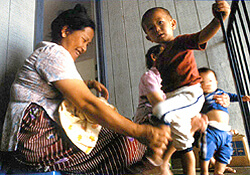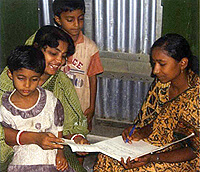 Social Workers are concerned with improving the health and quality of life of persons who are disconnected or excluded from larger society. Social Workers engage in practice at all levels, from working with children to working with communities and governments. The profession and the program at Monmouth are particularly concerned with social and economic justice, the representation and support of vulnerable or oppressed segments of the population, and direct action strategies to bring about positive change for the disenfranchised.
Social Workers are concerned with improving the health and quality of life of persons who are disconnected or excluded from larger society. Social Workers engage in practice at all levels, from working with children to working with communities and governments. The profession and the program at Monmouth are particularly concerned with social and economic justice, the representation and support of vulnerable or oppressed segments of the population, and direct action strategies to bring about positive change for the disenfranchised.
 Monmouth University offers an undergraduate degree, BSW in Social Work, as well as a graduate degree, MSW in Social Work. Both are nationally accredited.
Monmouth University offers an undergraduate degree, BSW in Social Work, as well as a graduate degree, MSW in Social Work. Both are nationally accredited.
The central mission of the School of Social Work at Monmouth University is to prepare its graduates for professional practice with a commitment to advancing human rights by implementing social and economic justice, improving the quality of life of vulnerable families, individuals, organizations, communities and nations on the local, national, and international levels.
Two Important Themes
The School of Social Work has developed curricula focusing on two important themes:
The Strengths Perspective
The strengths perspective is an approach to assessment in social work. It embodies efforts to tap into recognized capabilities and assets of families, individuals, organizations, communities, and nations. Strengths based assessment demands a different way of looking at families, individuals, organizations, communities, and nations. All must be seen in the light of their capabilities, talents, competencies, possibilities, visions, values, and hopes, however dashed and distorted these may have become through domination, oppression, and trauma.
Empowerment is the process of increasing personal, political, educational, and/or economic power so that families, individuals, communities, organizations, and nations can take action to improve their situations. The empowerment perspective employs intervention strategies intended to advance human rights by implementing social and economic justice. This includes preserving and restoring human dignity, and benefiting from and celebrating the diversities of humanity. Self and society are transformed to welcome and support the voices, the potential, the ways of knowing, and the energies of us all. Empowerment involves the redistribution resources so that the voices and visions of persons previously excluded from resources, knowledge, decisions and power are included. It is a process through which people gain the power and resources necessary to shape our world and reach our full, human potential as members of families in a global context.
Global Perspective
Understanding families within a global context recognizes that at this juncture in history, the local environments in which we live no longer solely define families. The definitions of family are expanding to include biological, legal, spiritual, and families of choice. The theme of families in a global context acknowledges that some individuals are in transition between their family of origin and their family of creation. Some individuals are without family by choice or circumstances, or may be in transition towards a new family of creation. Globalization and internationalization are increasingly replacing the local community as the basis for social identity.
Our global perspective on families informs both of our MSW tracks, Clinical Practice with Families and Children, and International and Community Development, as they develop students’ knowledge, values, and skills to advance human rights by implementing social and economic justice.
